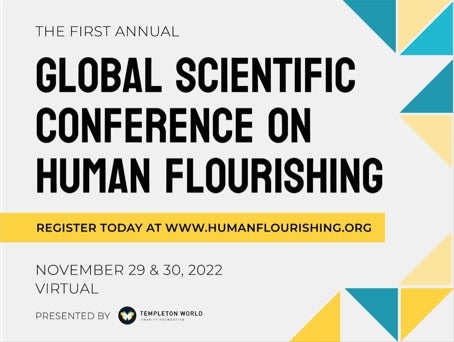Seeking a cross-cultural, multi-disciplinary understanding of why and how people thrive

ASU was selected to host an in-person workshop as part of the Global Scientific Conference on Human Flourishing, sponsored by the Templeton World Charity Foundation. Photo by Jill Wellington/Pexels
Despite news headlines screaming about viruses, inflation, climate and conflict, people across the world are actually better off than at any other time in history. Understanding how humanity continues to thrive, even in the face of adversity, is the focus of the Global Scientific Conference on Human Flourishing on Nov. 29 and 30.
This virtual conference is sponsored by the Templeton World Charity Foundation, and registration is free and open to everyone. Attendees will be able to listen to scientists, policymakers, religious practitioners and writers share their thoughts on how to ensure people do not just survive, but prosper. Conference registration is available at https://www.humanflourishing.org.
The conference organizers selected nine satellite locations across the globe, including Arizona State University, for invitation-only workshops focused on identifying and developing more specific ways to increase or sustain human flourishing.
Adam Cohen, a professor of psychology at ASU who is an expert in the study of religion and spirituality, was asked by the foundation to apply to host one of the satellite workshops. Cohen and Kathryn Johnson, associate research professor of psychology, were awarded a $100,000 grant to host the invite-only workshop.
“With speakers and attendees — both online and at the satellite workshops — coming from all over the world, the larger conference will offer an international and intercultural perspective on what it means to flourish. The ASU-hosted workshop will focus on the role of religion and spirituality in flourishing, because multiple studies have shown that religious people report more happiness, meaning in life and even better physical health,” Cohen said.
The ASU workshop, one of only two sites in the U.S., will take place at the Hermosa Inn in Paradise Valley, Arizona. Other workshops will happen in the U.K., Bahamas, Israel, Colombia, Rwanda, Kenya, Nepal and Stanford, California.
More than happy
Sessions of the Global Scientific Conference on Human Flourishing will explore the idea that flourishing is more than just people being happy and having their needs met.
"Flourishing is multi-faceted, and in addition to having physical, financial and social needs met, recent thinking has focused on people’s character and virtue. Are you really thriving if you are not contributing something positive to society?” Johnson said.
The conference will also examine how experiencing crises, getting through problems and even suffering can create opportunities for flourishing.
“The idea is that suffering could contribute to flourishing because it is how we learn to grow sometimes and can lead to character growth,” she said.
The role of religion and spirituality
The ASU satellite workshop will explore the role of personal growth through religious or spiritual beliefs and practices, and how these relate to whether and how people flourish.
“We will examine whether people can really flourish without religion or spirituality, where spirituality can be defined very broadly. People everywhere need to feel they have a sense of purpose and meaning in life greater than themselves,” Johnson said.
The hosts of each satellite workshop were required to set a goal. Cohen and Johnson want to understand what researchers do and do not know about the impact of religion on flourishing. They developed the guest list for the ASU workshop with intention: Attendees include economists, sociologists, political scientists, historians, psychologists and local faith leaders.
“The ASU workshop will include people coming from all over the world with expertise in many disciplines and at different stages of their careers. Our goal is to come away with a better sense of what research and innovations are needed to help spiritual leaders impact how people flourish across the world,” Cohen said.
Hava Tirosh-Samuelson, Regents Professor of history, Irving and Miriam Lowe Professor of modern Judaism, and director of the Center for Jewish Studies at ASU and Tracy Fessenden, Steve and Margaret Forster Professor of religious studies and director of strategic initiatives for the Center for the Study of Religion and Conflict will participate in ASU’s satellite workshop.
More Science and technology

ASU-led space telescope is ready to fly
The Star Planet Activity Research CubeSat, or SPARCS, a small space telescope that will monitor the flares and sunspot activity…

ASU at the heart of the state's revitalized microelectronics industry
A stronger local economy, more reliable technology, and a future where our computers and devices do the impossible: that’s the…

Breakthrough copper alloy achieves unprecedented high-temperature performance
A team of researchers from Arizona State University, the U.S. Army Research Laboratory, Lehigh University and Louisiana State…


